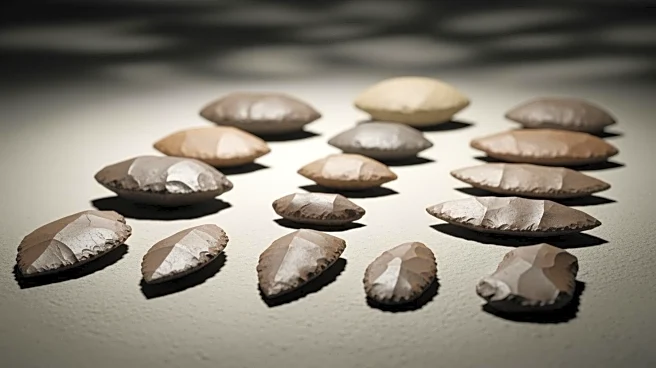What's Happening?
Anthropologist Christopher Bae from the University of Hawai’i at Mānoa has proposed the addition of two new species to the human family tree: Homo bodoensis and Homo juluensis. This suggestion has stirred
controversy within the scientific community, primarily because Bae and his colleagues have challenged traditional naming conventions for species. Bae argues that the existing rules are outdated and do not accommodate the removal of offensive names or ensure that names are easily pronounceable. The debate is part of a broader discussion on how to accurately classify ancient human species, with Bae's proposals aiming to address what he sees as a 'wastebasket taxon' issue with existing classifications like Homo heidelbergensis.
Why It's Important?
The proposal to add new species to the human family tree has significant implications for the field of paleoanthropology. It challenges existing classifications and could lead to a reevaluation of how ancient human species are identified and named. This debate also touches on ethical considerations in scientific naming conventions, particularly regarding names with colonial or offensive connotations. The outcome of this discussion could influence future research directions and the way scientists communicate about human evolution. It highlights the dynamic nature of scientific inquiry and the importance of revisiting established norms to reflect contemporary ethical standards.
What's Next?
The International Commission on Zoological Nomenclature (ICZN) has stated that it will not remove names from circulation based on ethical concerns, which suggests that the debate over species naming will continue. Bae and his colleagues are likely to continue advocating for changes in naming conventions, potentially influencing other scientific bodies to reconsider their policies. The ongoing discussions may lead to workshops and conferences aimed at reaching a consensus on these issues. Additionally, further research and discoveries in paleoanthropology could provide new evidence that supports or refutes Bae's proposals, shaping the future of the field.
Beyond the Headlines
The debate over species naming conventions reflects broader cultural and ethical shifts in science. It raises questions about the role of historical context in scientific classification and the responsibility of scientists to consider the cultural implications of their work. This discussion is part of a larger movement within the scientific community to address issues of diversity, inclusion, and representation. As such, it could lead to more inclusive practices in scientific research and communication, ensuring that the field of paleoanthropology is accessible and respectful to a global audience.









